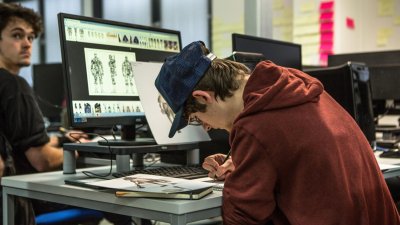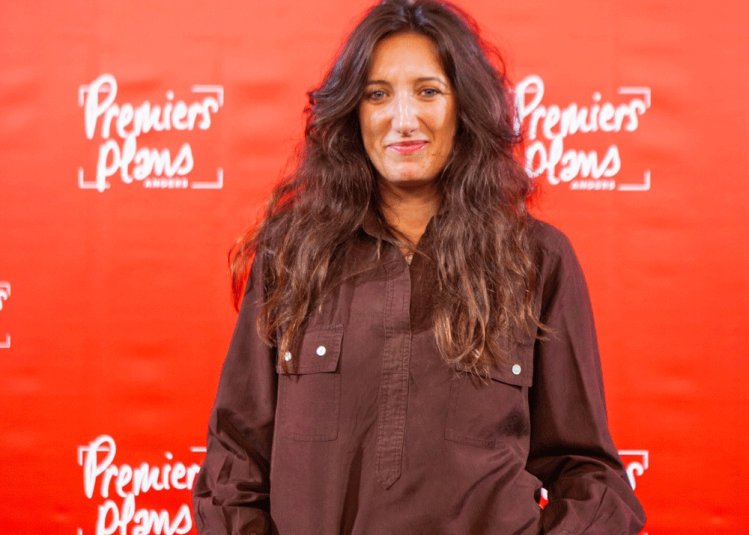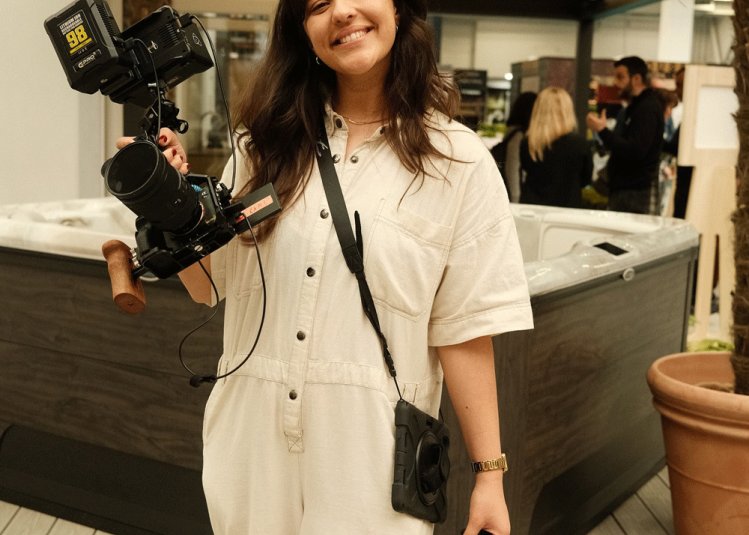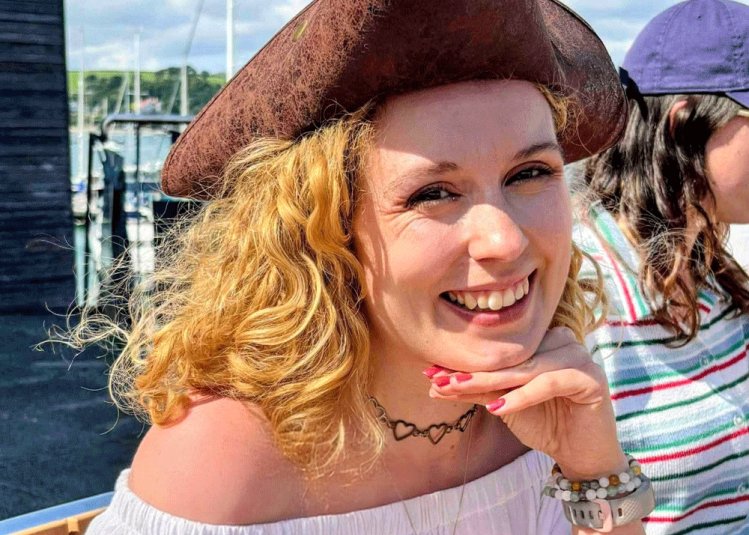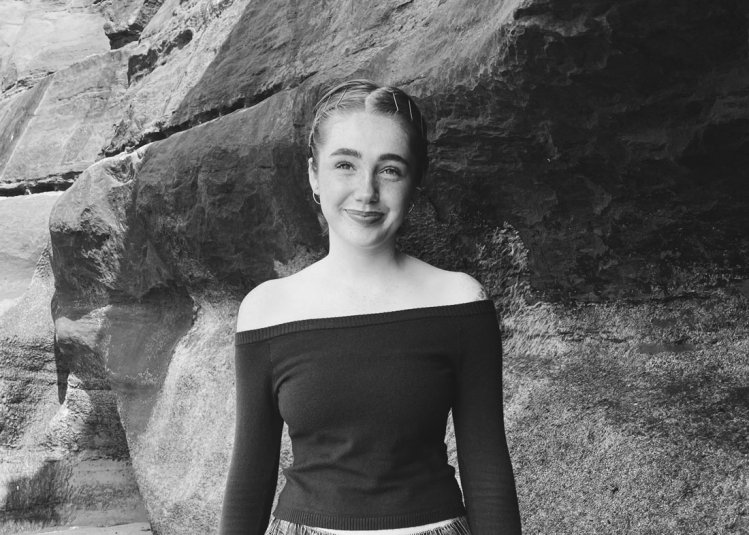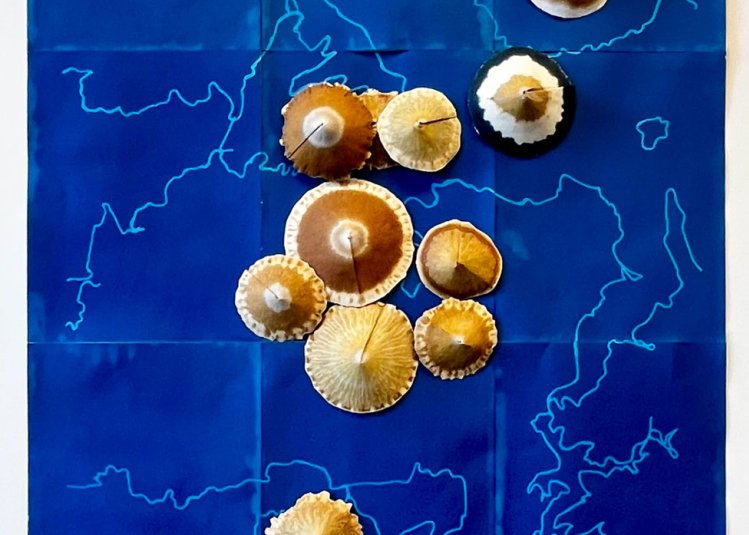Game Art graduate brings private jet interiors to life in VR
10 July 2025
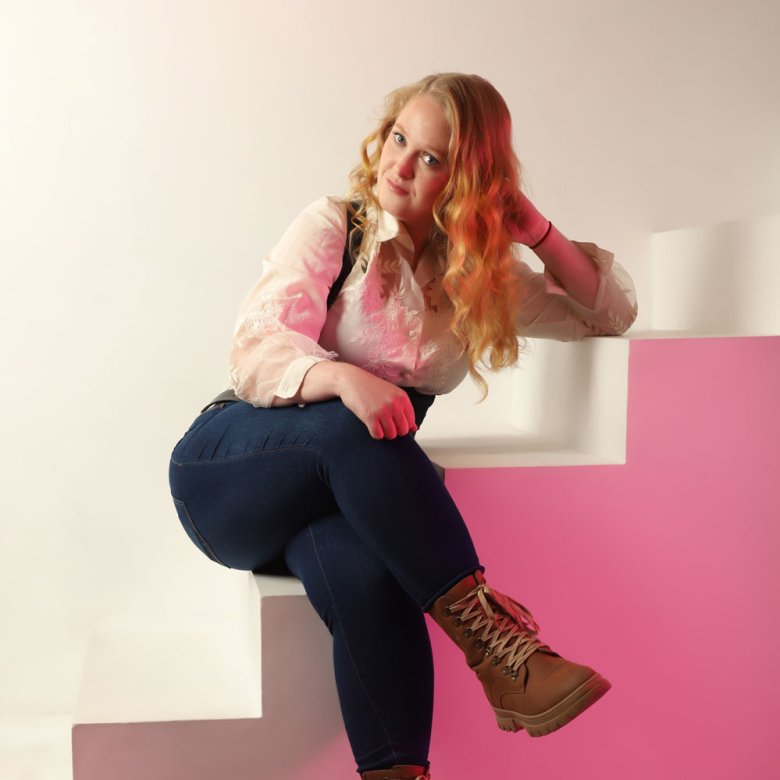
After developing core creative and technical skills on Falmouth’s BA and MA Game Art courses, from collaboration and problem solving to 3D modelling and engine work, graduate Tamsin Page is now thriving as an Immersive Media Artist at Sanders Studios. Working at the cutting edge of Virtual Reality (VR) design, she has recently led the creation of an interactive private jet simulation that allows clients to explore layouts and materials in real time.
Tamsin’s role blends artistic vision with real-world application. Her day-to-day includes everything from building environments and lighting scenes to testing VR performance and meeting clients across the country. Her journey into the field began in her first year at Falmouth, when she volunteered for a student-led VR project. That moment sparked four years of immersive collaboration and experimentation.
We spoke to Tamsin about how her time at Falmouth helped her discover her creative identity, build professional confidence and shape a career she genuinely loves.
How did you find the Game Art BA and MA courses at Falmouth?
My BA began during the pandemic, which meant adapting to remote learning from the outset. Once restrictions eased, connecting in person with passionate, driven and knowledgeable people brought everything to life and became a defining part of my experience. When you’re surrounded by others who want to make games and are eager to learn, it really pushes you forward.
Game development is hard. It’s full of unexpected challenges, especially early on while you're figuring out workflows and learning what works. There's no substitute for hands-on experience across a full development cycle. You make mistakes, see how they affect things down the line, and try again next time with a bit more knowledge. Being in a community where people share their discoveries and ideas really helps.
I chose Falmouth because of the chance to learn beyond my core course. While my focus was in the Games Academy, I loved collaborating with other courses and accessing other facilities to try new things. I screen printed, sewed, carved wood, worked with metal and used CNC machines. These were fun in their own right but also gave me a break from the screen and helped reset my creativity. When you’re deep in technical work, it’s easy to lose touch with the original spark. Engaging with other art forms helped bring it back.
Why did you move into VR?
In my first year, I originally wanted to work in mobile games, but the team I joined happened to be working in VR. In second year, I was placed in another VR team. Then I worked on a Spaceport Cornwall project through Immersive Business. By third year, I had four VR projects under my belt. At that point, I was just known as the VR artist. It felt like the right direction, and I haven’t looked back.
The skills from game development transfer directly into VR. Modelling, texturing, game engines, visual effects and rendering all still apply. You just have to work within VR’s limitations. In fact, those constraints often lead to more creative solutions. Finding different ways to solve problems in VR has helped me grow as an artist.
How did you find getting a job when you graduated?
By the end of my degree, I was known as the VR art student. Knowing that, one of my lecturers forwarded me a job listing, and the person hiring turned out to be another Falmouth graduate. He was the only member of that department at the time, and we’d worked together on projects during our studies. He already knew how we worked together, which made the move into the job feel natural.
The games and Extended Reality (XR) communities are small. People tend to know one another and each other’s work. That helps when looking for jobs or passing on roles that aren’t the right fit. I’ve sent job links to other graduates I thought would be a good match, and one of them now works at Oxford University. It shows how the relationships and reputation you build at Falmouth can lead to real opportunities.
Another colleague came to us after sending in her portfolio. She was from AMATA and impressed us with her work, so we hired her. Sometimes getting your work in front of the right people makes all the difference.
How are you finding your role as Immersive Media Artist at Sanders Studios?
My day-to-day work changes a lot depending on the project and the client. As an environmental game artist working in VR, I create meshes and textures, then do a lot of engine-based work with materials, lighting and effects. A key part of the job is testing in the headset and refining things over and over again. With untethered VR, you’re working under strict limits. We need to hit more than 72 frames per second and keep under a 2GB project size. That means many standard rendering tricks don’t work, so we have to find creative solutions.
I’m based in the Falmouth office, but many team members are remote, including people in Italy, Poland, Lithuania and Thailand, so communication is really important. I also travel to meet clients, often in places like Farnborough or London, to work directly with designers, architects and sometimes even the end clients. One even sent me a Christmas present! These meetings call for professionalism, good people skills and the ability to explain complex ideas clearly. We’re always looking for new ideas to push what VR can do, so it's a mix of technical skill, creative thinking and working closely with others.
Lately, I’ve been working on a VR private jet demo. I was the main person on it, and I’m especially proud of the result. It helps clients understand how to use space in a jet interior and lets them swap materials and layouts in real time. I also created interactions using Blueprints, like drawers and doors that open naturally, and added subtle lighting to make the space feel real. Getting those elements to work smoothly in VR was tough, but really satisfying.
I’m proud of the work I’m doing now. I work with a small team full of talented people, and I’ve learned so much since starting. I genuinely enjoy what I do.
Do you still draw in your spare time?
Yes, I go to a drink and draw session every Wednesday. It’s often the only time I get to sketch these days, but it’s a good break from screen work. I enjoy drawing creatures and organic forms. It’s a nice contrast to the structured shapes I deal with at work.
What games do you love?
I love role-playing games (RPGs). Mass Effect, Fallout, Neverwinter Nights and The Witcher are favourites. I also play a lot of tabletop RPGs. My top picks are Dungeons & Dragons, Starfinder, Psi Run, Mothership and Judge Dredd. Atomfall is waiting to be played at home. Some Falmouth graduates worked on it, so I’m looking forward to trying it.
External links
